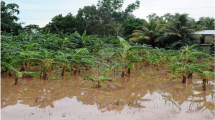Abstract
Most research in support of agricultural development and natural resource management in densely settled mountain ecosystems continues to emphasize component over system-level goals. Research by plant breeders, foresters and animal scientists is generally designed to maximize the yield of products within their particular area of expertise (edible plant parts, tree products and livestock products, respectively), while soil scientists aim largely to increase soil nutrient stocks. At landscape level the same dynamic holds within the agronomic sciences, while water engineers work independently to conserve water through its isolation from broader landscape dynamics, and other common property resources remain largely ignored. Opportunities to foster positive synergies between system components, and to integrate livelihood with conservation goals, are generally missed.
This paper presents experiences of the African Highlands Initiative, an ecoregional program of the Consultative Group for International Agricultural Research (CGIAR) and a network of the Association for Strengthening Agricultural Research in Eastern and Central Africa (ASARECA), in operationalizing integrated research at farm and landscape scale. Following a discussion of the shortcomings of the conventional research paradigm that beg for stronger integration and a review of the contributions of extant research paradigms that help us move in the right direction, the paper lays a conceptual foundation for integrated research. System components at farm and landscape level are delineated, and this somewhat arbitrary conceptual partitioning of agroecological systems shown to influence the current research paradigm as well as the partitioning of institutional mandates. Diverse meanings of systems integration are then discussed to illustrate the synergies that might be built into agricultural and natural resource research programs. The distinction between the logic of maximization and optimization is then utilized to distinguish between component and “system-level” goals. This conceptual overview is followed by several case studies to illustrate how these concepts can guide the formulation of integrated research objectives, methods and outputs at farm and landscape scale. The paper concludes with a discussion of the implications of this alternative research paradigm for the structure, function and skill base of national and international agricultural research systems.
Similar content being viewed by others
References
Atran S. 1990. Cognitive Foundations of Natural History: Towards an Anthropology of Science. Cambridge: Cambridge University Press.
Bashaasha B. and Boesen J. 2004. Poverty Analysis in Integrated Agricultural Research for Development. Uganda Journal of Agricultural Sciences 9:23–30.
Berlin B. 1992. Ethnobiological Classification: Principles of Categorization of Plants and Animals in Traditional Societies. Princeton: Princeton University Press.
Bekele B. and Lakew B. 2004. Participatory On-farm Food Barley (Hordeum vulgare L.) Adaptation Trial in Ginchi Watershed Site of Ethiopia. Proceedings of Integrated Natural Resource Management in Practice, ICRAF, Nairobi, 12–15 October, 2004.
Biggs S. D. 1989a. A Multiple Source of Innovation Model of Agricultural Research and Technology Promotion. AgREN Network Paper 6. London: Overseas Development Institute.
Biggs, S. D. 1989b. Resource poor farmer participation in research: A synthesis of experiences from nine national agricultural research systems. Comparative Study Paper No. 3. The Hague: ISNAR.
Blum A., Röling N. and Engel P. G. H. 1990. Effective management of Agricultural Knowledge Systems (AKS): An analytical approach. Quarterly Journal of International Agriculture 29(1): 27–37.
Bruijnzeel L. A., Bonell M., Gilmour D. A. and Lamb D. 2005. Forests, water and people in the humid tropics: An emerging view. In: Bonell M. and Bruijnzeel L. A. (eds.), Forests, Water and People in the Humid Tropics. UNESCO International Hydrology Series. Cambridge: Cambridge University Press. Pp 906–925.
Byerlee D. 1998. The search for a new paradigm for the development of national agricultural research systems. World Development 26(6):1049–1055.
Chambers D. E., Wedel K. R. and Rodwell M. K. 1992. Qualitative research methods and the constructivist paradigm in the evaluation of social programs and policies. In: Chambers D. E. (ed.), Evaluating Social Programs. Boston: Allyn & Bacon, 288–332.
Chambers R. 1993. Challenging the Professions: Frontiers in Rural Development. London: Intermediary Technology Publications.
Chema S., Gilbert E. and Roseboom J. 2003. A review of key issues and recent experiences in reforming agricultural research in Africa. ISNAR Research Report 24. The Hague: ISNAR.
FAO and World Bank 2000. Agricultural Knowledge and Information Systems for Rural Development: Strategic Vision and Guiding Principles. Rome: FAO and World Bank.
Gebremedhin W., Solomon A., Kassa B. and Gebre E. 2004. Participatory Potato Technology Development and Dissemination in the Central Highlands of Ethiopia. Proceedings of Integrated Natural Resource Management in Practice, ICRAF, Nairobi, 12–15 October, 2004.
German L., Charamila S. and Tesema T. in press a. Managing Trade-Offs in Agroforestry: From Conflict to Collaboration in Natural Resource Management. In: Klappa S. and Russell D. (eds.), Transformations in Agroforestry Systems. New York, Oxford: Berghan Press.
German L., Kidane B. and Shemdoe R. in press b. Social and Environmental Trade-Offs in Tree Species Selection: A Methodology for Identifying Niche Incompatibilities in Agroforestry. Environment, Development and Sustainability.
Hagmann J., Chuma E., Murwira K., Connolly M. and Ficarelli P. 2002. Success Factors in Integrated Natural Resource Management R&D: Lessons from Practice. Conservation Ecology 5(2):29.
Hall A., Clark N., Sulaiman R., Sivamohan M. V. K. and Yoganand B. 2000. New agendas for agricultural research in developing countries: Policy analysis and institutional implications. Knowledge, Technology and Policy 13(1):70–91.
Hall A. and Nahdy S. 1999. New methods and old institutions: The ’systems context’ of farmer participatory research in national agricultural research systems, The case of Uganda. AgREN Network Paper No. 93.
Johnson B. 1997. Systems of innovation: An overview and basic concepts. In: Edquist C. (ed.), Systems of Innovation: Technologies, Institutions and Organizations. London: Pinter Publishers.
Lal P. and Lim-Applegate H. and Scoccimarro M. 2001. The Adaptive Decision-Making Process as a Tool for Integrated Natural Resource Management: Focus, Attitudes and Approach. Conservation Ecology 5(2):11.
Marcus G. E. 1995. Ethnography in/of the World System: The Emergence of Multi-Sited Ethnography. Annual Review of Anthropology 24:95–117.
Meerman A. V. F. 1997. Can we make IPM work for resource-poor farmers in sub-Saharan Africa? International Journal of Pest Management 43(4):313–320.
Meinzen-Dick R., Knox A., Place F. and Swallow B. (eds.) 2002. Innovation in Natural Resource Management: The Role of Property Rights and Collective Action in Developing Countries. Baltimore: Johns Hopkins University Press.
Rees D. J. and Nampala M. P. 2004. Integrated Agricultural Research for Development: Achievements, Lessons Learnt and Best Practices. Conference Brief, 1–4 September, 2004. Entebbe, Uganda: NARO.
Rocheleau D. and Edmunds D. 1997. Women, Men and Trees: Gender, Power and Property in Forest and Agrarian Landscapes. World Development 25(8):1351–1371.
Rocheleau D., Wangari E. and Thomas-Slayter B. 1996. Feminist Political Ecology: Global Issues and Local Experiences. London: Routledge.
Rogers E. M. 2003. Diffusion of Innovations, 5th ed. New York: Free Press.
Schroeder R. A. 1993. Shady Practice: Gender and the Political Ecology of Resource Stabilization in Gambian Garden/Orchards. Economic Geography 69(4):349–365.
Starks Acosta A., Jones M. and von Kaufmann R. 2005. The Sub-Saharan Africa Challenge Program: An Experiment in Mainstreaming Institutional Learning and Change. Institutional Learning and Change ILAC Brief 9.
van Noordwijk M., Tomich T. P. and Verbist B. 2001. Negotiation Support Models of Integrated Natural Resource Management in Tropical Forest Margins. Conservation Ecology 5(2):21.
Author information
Authors and Affiliations
Rights and permissions
About this article
Cite this article
German, L. Moving beyond component research in mountain regions: Operationalizing systems integration at farm and landscape scales. J. Mt. Sci. 3, 287–304 (2006). https://doi.org/10.1007/s11629-006-0287-2
Received:
Accepted:
Issue Date:
DOI: https://doi.org/10.1007/s11629-006-0287-2




